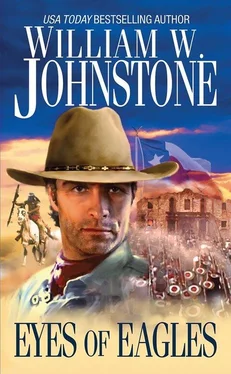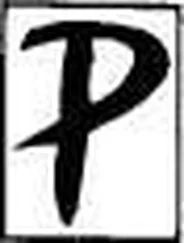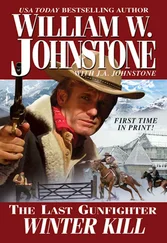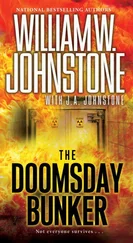“I fear he’s mighty right, boys. Mighty right.”
Jamie walked to Bowie’s quarters and looked in. Bowie was awake, but his face was pale and his eyes shiny with pain. He waved Jamie to a chair. “Get us some coffee, Sam. Would you please?”
“How does it look out there, Jamie?” Bowie asked.
Jamie brought the knife fighter up to date.
Bowie coughed and the pain nearly caused him to pass out. He spat blood into a rag and smiled wanly at Jamie. “I guess I’ll die right here in this damn room, lad.” He was one hundred percent accurate in his prediction. From that moment on, James Bowie, born in Logan County, Kentucky, around 1796, would leave that dark room only one more time until his death.
“Can I get you anything, Colonel?” Jamie asked.
“A new body would be nice. Jamie,” he said with a smile. “If by some chance you are trapped in here at the end, and I pray God that you are not, see to it that my knife is close to my hand, would you? I’ll need it when I meet the Devil.”
“Hush that kind of talk!” Sam said, bringing the men coffee.
Bowie laughed. “I gave him his freedom and now I got me an uppity darky on my hands, Jamie.”
Sam wet a cloth and bathed Jim’s face with gentle hands. “I got me a thought that the top man on the other side would let you pass free, Master Jim. Why won’t you let me try?”
“I told you to git, Sam,” Bowie whispered. “I’ll write out a paper saying that you took no part in any combat.”
“I’ll stay,” Sam said firmly.
“Not only has he turned uppity, he’s stubborn as a damn mule to boot,” Jim said. He cut his eyes to Jamie. “I’m still writing that letter, Jamie. I’ll have it finished in time.”
Jamie opened his mouth to lodge a protest and Bowie held up a hand. “I have officially assigned you to Travis’s command, lad. It’s all legal. Bill has said that you will be the last man over the walls with our messages. Them that can write have done so or are doing so. Or they’re getting someone to do it for them. You’ll carry the last words of farewell from this valiant garrison. That’s firm.”
“Yes, sir,” Jamie said. “As you wish.”
“Fine. That’s settled. Now leave me. I’ve not been much for writing long missives and it’s a chore.”
“Jim?”
“Yes?”
“I don’t want to be branded a coward.”
Bowie smiled. “You won’t be. How could you be faulted for obeying a direct order? Only a fool would RIP back to a certain death.”
The sounds of the Mexican cannons intensified; the crash of ball and grapeshot slamming against the walls trembled the floor beneath Jamie’s feet. Jamie left the room and Bowie took pen in hand and began slowly writing.
* * *
Events were now unfolding that would seal the fate of those trapped — albeit willingly — inside the Alamo. Fannin had finally decided to act on his own initiative. While Jamie was speaking with Jim Bowie, Fannin and a force of some three hundred men pulled out of Goliad, starting the march to aid those at the Alamo. At the same time, a small force of some thirty volunteers at Gonzales, some seventy miles away to the east, under the command of George Kimbell, was making ready to ride to the Alamo.
Fannin’s relief column got about a mile outside of Goliad — the fort was still in sight — when a wagon broke down. The column was halted while the wagon was repaired. For reasons that were, and are, known only to him, Fannin decided to camp there and wait until the next morning before resuming the march. During the night, the oxen used to pull the wagons got loose, or were freed, and the men spent the entire day of February 27th rounding them up.
Late that day, Fannin decided to return to Goliad. Again, no one knows why he chose to do that. If it was ever really known, the reasons have been lost over time. What is known is that Fannin, on that cold winter’s late afternoon, called a meeting with his officers and shortly after the meeting, the column turned around and went back to the fort at Goliad.
While Fannin and his men were retreating back to Goliad, Kimbell and his tiny force of volunteers were making their way to the Alamo. They were moving cautiously, with as much speed as possible, for advance scouts had reported back that Mexican patrols were, “All over the goddamn place!”
At the Alamo, the siege had settled down to a nerve-grinding battle of artillery with only sporadic rifle fire from either side. The Mexican artillery had done little damage and killed no one. The defenders along the walls were dropping Mexican soldiers with nearly every round they fired.
Travis had not discussed it with anyone — he did not want to worry the seriously injured Bowie — and he had called no meetings with his officers. But he knew that Goliad was, at the very most, a four day march from the Alamo. If Fannin did not show up with reinforcements by the 27th, that meant, to Travis’s mind, that Fannin was not coming at all.
Travis began to haunt the parapets and ramparts, taking chances at peering over the walls, straining his eyes to spot a relief column that was not coming. The men knew what he was doing; but they said nothing. However, they thought plenty
Davy Crockett was a man of the forests and the open areas. He paced restlessly all about the walled-in compound. He did not like this type of fighting.
Jamie squatted on his heels, rifle in hand, his face impassive, waiting.
On his bed, his death bed, Jim Bowie wadded up and discarded page after page, not satisfied with his words. He alternately wrote his prose and cursed Fannin, Houston, Governor Smith, and everybody else he could think of who was in a position to send help, but who would not. The list was a lengthy one.
Every man in the Alamo knew they were running short of powder. Every man there realized, without doubt, they alone could not hold against the sustained charges they knew were coming. They all had been told that Santa Anna was not a patient man. If he had to sacrifice every man in his army to crush this rebellion, he would not hesitate to do so.
Reinforcements simply had to arrive. It was that basic. Without help, the men in the Alamo would die. All of them. And all of them knew this.
Some men cursed. Others prayed. Crockett paced the plaza like an angry panther. Travis stared out at thousands of Mexican troops. Still others, like Jamie Ian MacCallister, were impassive and stoic. The men thought of hearth and home. Those that had not yet written their farewells borrowed pen or quill and ink and paper and did so. The defenders of the Alamo all waited and watched for help that did not arrive. And would not arrive in any force large enough to be effective against Santa Anna’s thousands.
The politicians talked and talked and debated and procrastinated and patted themselves on the back for their brilliance... while the men of the Alamo, as soldiers have done for centuries, waited to die.
* * *
Crockett ceased his pacing and squatted down beside Jamie. ’Talk is, lad, that if help don’t come by tomorrow, it ain’t comin.’ ”
Jamie nodded his head in agreement with that. Like every man there, he needed a shave and he needed a hot bath. The women there were doing their best to stay up with the laundry, but they were running out of soap. The defenders were living on meager portions of beef and beans and corn — and that was running out as well. Coffee was now being rationed.
Crockett handed Jamie a slip of paper. “I ain’t much for hand-writin’, lad. But if you’d see this gets posted, I’d be obliged.”
“I shall, sir. You know that Colonel Travis is sending me over the wall at the last moment?”
“I do. And a mighty important job it is, too.”
Another man walked up and handed Jamie a note. “I’d be obliged,” was all he said.
Читать дальше









